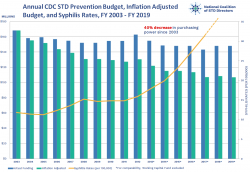As STD Funding Stagnates, Rates Rise to All-time Highs
This blog explores federal budget impacts on STDs, how funding is being leveraged, and what increased funding for STD prevention could mean for public health.

This blog was originally posted on Coalition for Health Funding’s website, here.
Current State of STDs
In the U.S., the STD epidemics of gonorrhea, chlamydia, and syphilis are at crisis levels. For the fourth year in a row, STD infections reached all-time highs. In 2017, over 2 million new infections, about the population of Houston or Chicago, were reported by the Centers for Disease Control and Prevention (CDC), and early data from 2018 shows these steep increases continuing. Antibiotic-resistant gonorrhea in the U.S. has moved from a threat on the horizon to an inevitability. Newborn syphilis cases (congenital syphilis), a condition resulting in stillbirth or early infant death in up to 40 percent of cases, more than doubled in the last five years and is now five times more than the number of cases of maternal to child HIV transmission. Young people (ages 14-25) and marginalized populations continue to bear the brunt of these epidemics.
Turning the STD tide will require a national response. But, as presently equipped, the national network of public health STD prevention programs are understaffed and overmatched.
Importance of STD Funding
State and local STD programs and sexual health clinics are essential access points to sexual health care and STD testing for those most at risk for STDs. Unfortunately, the historic rise in STDs has not been mirrored by increased investment in these programs. Federal STD prevention funding at CDC has seen a 40 percent reduction in buying power since 2003, and in recent years, nearly half of all jurisdictions reported closing clinics or severely reducing hours or staff.

The depletion of this network guarantees more infections and the associated adverse health consequences of undiagnosed and untreated STDs.
Funding and Policy Landscape
At the national level, a fight led by the National Coalition of STD Directors (NCSD) is ongoing to raise awareness about the needs of the STD field. NCSD creates opportunities for its members, the state and local STD programs, and those working in sexual health and STD prevention to advocate for resources and policies to fight the STD epidemics. A key part of this effort is bringing the needs of the STD field directly to Congress.
In May 2019, after years of federal and state funding flat funding and cutbacks, the House Appropriations Committee passed the Fiscal Year 2020 (FY20) Labor, Health and Human Services (LHHS) appropriations bill that included a $10 million increase for STD prevention. The bill also included an increase of $16.9 million to the Division of Adolescent and School Health (DASH), and $140 million of new funding to the CDC’s National Center for HIV, Hepatitis, STD, and Tuberculosis Prevention for Ending the HIV Epidemic initiative, in which STDs were featured prominently. The Ending the HIV Epidemic initiative proposed in the FY20 President’s budget presents an opportunity for state and local STD programs to be included in ending the epidemic due to the syndemic nature of STDs and HIV.
NCSD is pleased to see the profile of STDs raised at the national level and the passage of the Bipartisan Budget Act of 2019 that raises funding for nondefense discretionary programs by $27 billion. During the Senate appropriations process, NCSD will be working hard to ensure the Senate appropriates an increase, similar to the House’s for STD prevention funding.
The administration’s recent rule changes to Title X prohibits organizations that refer patients for abortions from receiving federal funding. Many states rely solely on family planning clinics as their network of STD providers and this regulation threatens access to STD testing and treatment for more than 4 million low-income people who rely on providers receiving Title X funding. In 2017, over 6.4 million Title X-funded STD and HIV screening services were performed.
Get Involved
The U.S. is facing a public health crisis as the STD epidemics rage on. You can help spread awareness about the needs of the STD field by becoming an NCSD member, contacting your Senators and Representatives, and joining NCSD for STD Engage 2019, the annual meeting for STD programs. Everybody can play a role in the ongoing fight to end the STD epidemic and making sure the field receives the funding it needs.